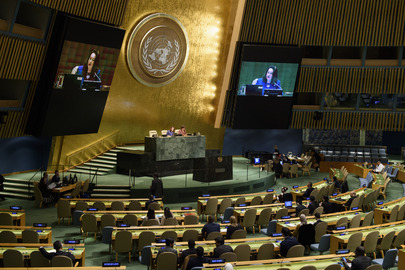Education Diplomacy at the UN General Assembly 2018


The focus on education at the global level continues to increase, and the 73rd Session of the United Nations General Assembly (UNGA) in New York was no exception. The Association for Childhood Education International’s Center for Education Diplomacy participated in several key events that demonstrated the need for Education Diplomacy to achieve the Global Goals.
Diane Whitehead, Executive Director of ACEI, and Yvette Murphy, Director of the Center for Education Diplomacy, attended the Annual High-Level Forum to Make the UN Sustainable Development Goals a Reality. The dynamic discussion included a new initiative called Learning Economy, which is an innovation designed to promote learning, social agency, and access to capital around the shared value of education. Using blockchain technology, people are paid to learn with the Learn Coin cryptocurrency, which can be initially exchanged for more education services or an opportunity to earn a “micro-diploma.” Learn Coin could potentially revolutionize the way learning happens across borders. Education Diplomacy will be essential to work across multiple sectors – governments, information technology, finance, labor, business, etc. – and thereby ensure that Learning Economy is overcoming social and economic challenges to meet the education needs of learners and communities in terms of access, quality, and inclusion.
In other forms of innovative education financing, the International Finance Facility for Education (IFFEd), a key recommendation of the Education Commission, was also announced during the UNGA, although it will be officially implemented next year. While not all donor countries have yet pledged financial support, the World Bank announced its full commitment and will start approaching credit rating agencies. Much like the International Finance Facility for Immunisation, IFFEd will work to increase available financing for global education by increasing the capacity of international and regional development banks to loan to lower income countries.
In addition, the Education Commission released “Investing in Knowledge Sharing to Advance SDG 4,” a new report outlining important recommendations for knowledge sharing in education, including investment in global public goods, capacity development, and networking as part of the global education ecosystem. Education Diplomacy becomes increasingly important as a set of practices, processes, and skills that will help navigate the global education ecosystem and the global governance of education.
The largest global education fund, the Global Partnership for Education, received a pledge of $116 million from the Dutch Government, increasing its total to $2.3 billion since the replenishment in Senegal earlier this year. Denmark also increased its commitments to Education Cannot Wait Fund, a global fund targeted to education for children living in crisis or conflict areas. A High Level Meeting on Action for Refugee Education gathered major government, international organization, private sector, and civil society stakeholders to discuss how to accelerate the commitments made under the New York Declaration for Refugees and Migrants in 2016. Education Diplomacy plays an important role in negotiating these kinds of commitments.
Diane and Yvette also attended the Varkey Foundation’s Global Teacher Prize Reception, recognizing the 2018 prize winner, Andria Zafirakou from the UK. Teachers often serve as Education Diplomats, and Zafirakou is no exception, partnering with the Coulthard Institute and the Japanese Koo Stark Project “Kintsugi,” and working with an “Artist in Residence” (Armando Alemdar) to creatively redesign the art curriculum “to promote inspiration and help pupils confront and cope with the responsibilities of their complex home circumstances.”
Girls’ education featured prominently this year at the UNGA, as leaders from Canada, France, Britain, Kenya, Niger, and Jordan declared a common agreement on their commitment to promote gender equality. They signed a joint statement, 12 Years to Break Barriers and Leave No Girl Behind, with major global education stakeholders. In it, they “commit to galvanizing political will to deliver on the SDG 4 commitments to girls’ education and use upcoming events such as the Global Education 2030 Meeting organized by UNESCO in December 2018 and the SDG High Level Political Forum in July 2019 to take stock of progress in the countdown to 2030.” These global commitments to girls’ education, which are a feat of negotiation and consensus building through Education Diplomacy, continue to gain momentum.
Finally, two important youth-related initiatives and reports were released at the UNGA this year. Generation Unlimited uses new global partnerships (governments, the private sector, academia, etc.) to bring all young people age 10-24 into some form of schooling and employment by 2030. The Global Business Coalition for Education released “Preparing Tomorrow’s Workforce for the Fourth Industrial Revolution,” which explores the potential for the business community to support youth globally and grow the “workforce of the future.” Both of these initiatives use Education Diplomacy to engage new partners in education, particularly the business sector.
Learn more about education at the UNGA here, and about Education Diplomacy here.
Achieving Quality Early Childhood …
Using Negotiation and Consensus …
Sign up for Center updates
Partnerships and Affiliations:
We celebrate our partnerships with DiploFoundation and UPEACE Centre for Executive Education and our affiliation with the United Nations.
You can reach the Center for Education Diplomacy at Association for Childhood Education International
1875 Connecticut Ave. NW, 10th Floor | Washington, D.C., 20009 | (202) 372-9986 | Toll-free U.S. & Canada: (800) 423-3563 | Contact Us